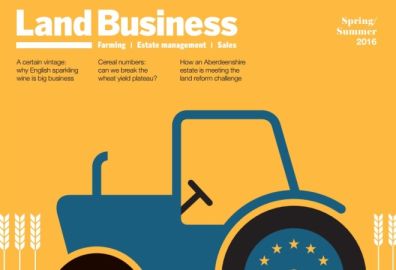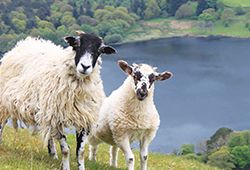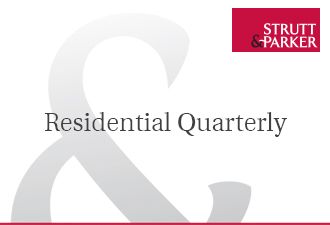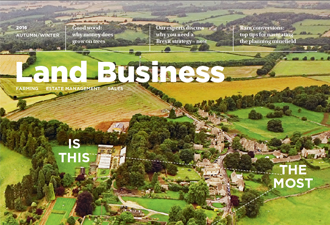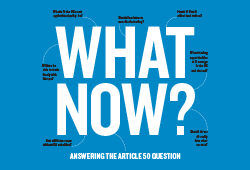
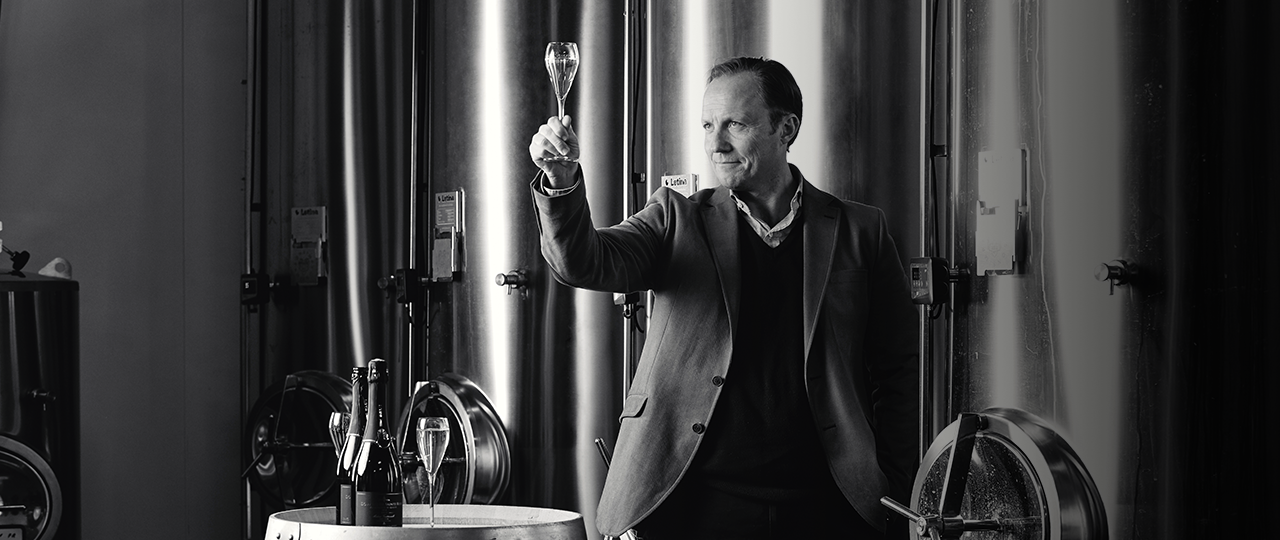
In 2012, winemakers Charles and Ruth Simpson purchased a slice of Kent countryside through Strutt & Parker. Now, their plans to produce English sparkling wine are coming to fruition.
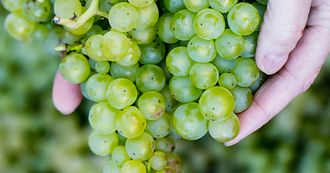
Why would the owners of a successful vineyard in the south of France decide to buy land in Kent to expand their acreage? It’s 700 miles further north and is unlikely to get anywhere near the 300 days a year of grape-ripening sunshine enjoyed in le Midi.
But that is exactly what Charles and Ruth Simpson – the British owners of Domaine Sainte Rose, near Servian in the Languedoc – have done. Having spent 15 years developing their French estate into an award-winning producer of high-quality wines, the next phase of their business has neatly dovetailed with the burgeoning English sparkling wine industry.
Vineyards have existed in the comparatively mild climates of Kent, Sussex and Hampshire for many years, but it is only recently that English sparkling wine has been accepted as a serious contender on the world stage. ‘English fizz’ was given a further seal of approval at the end of 2015 when Champagne Taittinger bought 171 Kent acres through Strutt & Parker, less than 20 miles from the Simpsons’ estate in Barham, on the other side of Canterbury.
Where the conditions are right, east Kent’s chalky soil areas are proving highly suitable for viticulture. The soil, essential for cultivating the grapes that produce high-quality sparkling wine, is similar to that in parts of Sussex, and indeed in the Champagne region of France.
Demand for land
Charles and Ruth bought their Kent estate in 2012, three years before Taittinger, but both transactions were arranged through Nigel Porter, Land Management Partner in Strutt & Parker’s Canterbury office.
‘We’ve seen an increased demand for land in this area, both from French champagne houses and others interested in viticulture,’ he says. ‘There’s a massive difference in land values, which makes it attractive to French growers; you could pay a million euros a hectare [£350,000 an acre] for planted land in the Champagne region, but here, arable land is worth a fraction of that: around £10,000 an acre, base value.’
But for how much longer? ‘We could soon be in a situation where land suitable for vines will be of higher value, even if it’s currently arable,’ adds Porter.
As soon as he was asked to sell the land at Barham in 2011, Porter thought that it had the potential to become a vineyard. ‘When we got the viticulturist’s report confirming that it did, we took the bold step of tailoring our marketing specifically at the wine industry through specialist media,’ he explains. ‘We were the first firm to do that.’
Although this approach drew doubtful comments from other property professionals, it worked. The Simpsons had been considering developing a wine estate in the UK for some time, so were interested as soon as they spotted the land being marketed on Decanter online.
‘We had lots of reasons to set up a base in the UK,’ says Ruth Simpson. ‘Domaine Sainte Rose was well established and we could leave our team to run it when we were away. We were very keen to make sparkling wine and knew the conditions could be good in Kent. And we wanted our two children to pursue their secondary education in the UK.’
The farming family who owned the land wanted to release some capital but didn’t want to sell a large acreage – an ideal scenario, in fact, for a new vineyard. ‘You need fewer acres to make a living out of viticulture than you do for arable farming,’ says Porter.
The Simpsons bought two plots, totalling 87 acres. ‘We invested in this land because not only was it chalk soil, but both plots were less than 100 metres above sea level, had south-facing slopes, and shelter from winds to protect young shoots,’ says Charles Simpson. ‘When you’re growing in marginal weather conditions as in the UK, you need to make sure everything else is in your favour – we’re very pleased with both sites.’
The couple wanted to secure the land but weren’t ready to plant, so Strutt & Parker managed it for them, farming it for two years through a local arable farmer. ‘We went from acting for the seller to acting for the purchaser, which worked well for everyone,’ says Porter.
Watch the video to discover more:
Up and running
As a precursor to the English venture, Domaine Sainte Rose’s first-ever sparkling wine was produced in the Languedoc in 2012. The first vintage was launched in 2013, and by 2014 the Simpsons were based in the UK. That same year, they bought two large barns close to their land for their new winery, which was installed in 2016 with the help of a Rural Development Programme for England Growth Programme grant.
‘We had to jump through a lot of hoops to get the grant, including demonstrating how we would generate jobs in the local community,’ says Ruth, ‘but it was worth it, as we were given £143,154, which is 37.5% of the cost of the winery.’
The Simpsons planted their first block of vines on English soil in 2014, on the smaller of the two plots, using the same three varieties of grape – chardonnay, pinot noir and pinot meunier – used to make all champagne. The first harvest in 2016 was an encouraging one, with the plentiful juice soon in the winery’s brand-new stainless-steel fermentation tanks.
The second, larger plot was partially planted in 2016, with more vines going in this year. A small amount of still chardonnay will be bottled in 2017, with the first English sparkling wine released in 2018. They have already sold half of the sparkling product to the online retailer Naked Wines – impressive, especially for a first vintage. Future plans include a tasting room at the winery, which they hope will be completed in time to sample the 2018 vintage.
A grassroots approach
The Simpsons have approached their English enterprise with the same insistence on authenticity and provenance as their French business. They learned their skills ‘on the job’ in France, buying a small chateau and vineyard for, as Ruth says, the price of a London flat, and giving up their day jobs to put everything into their new venture. Charles’ business background gave him relevant skills including financial management and marketing; Ruth’s family makes Scotch whisky, so she understood the risks and the need for long-term investment in an agricultural business.
Above all, they didn’t want to simply take over an existing business and do what had already been done. Having read about a loosening of rules in the Languedoc, they used New World winemaking methods, good fruit grown on their own land and minimal intervention to produce quality wines, creating a profitable business that sells up to 400,000 bottles each year.
‘We do not buy in external fruit in France and don’t aspire to in England,’ says Charles. ‘We want to be part of the process, from the grape to the glass.’
So how will the Simpsons’ English sparkling wine compare with the Domaine Sainte Rose version? ‘Our aim is to create an even finer méthode traditionnelle than we can in the Languedoc,’ says Ruth. ‘The challenge in warmer climates is to keep the purity, lightness and finesse you want in a sparkling wine. With the UK’s cool climate, our acidities will be higher, something that is essential for ageing this type of product. We believe that our English production will compete with the finest sparkling wines in the world.’
Read more
To find out more about Strutt & Parker's expertise in viticulture and buying and selling vineyards, visit struttandparker.com/viticulture.
This article originally appeared in Strutt & Parker's magazine, Land Business Spring/Summer 2017. Read the full magazine here.


